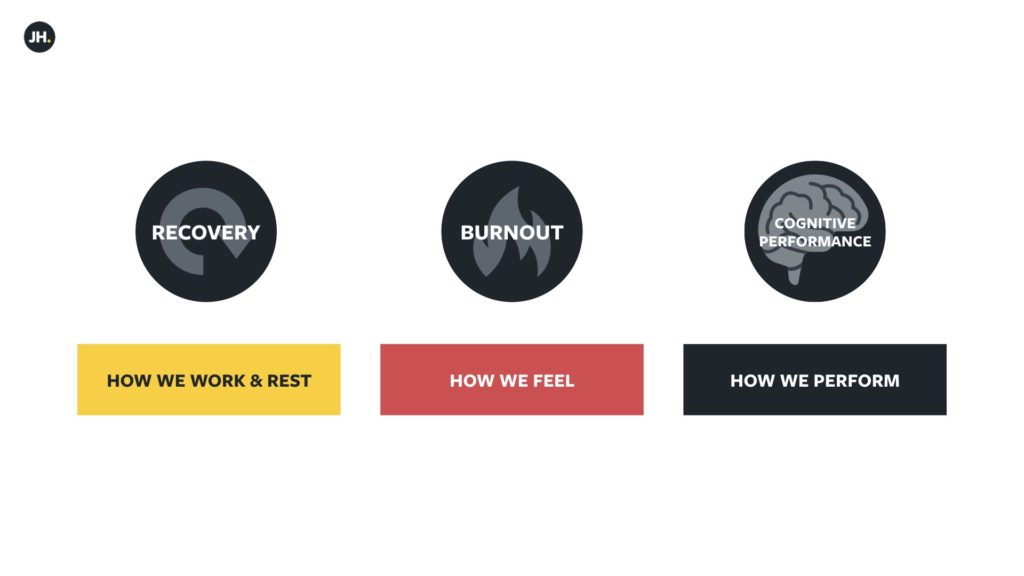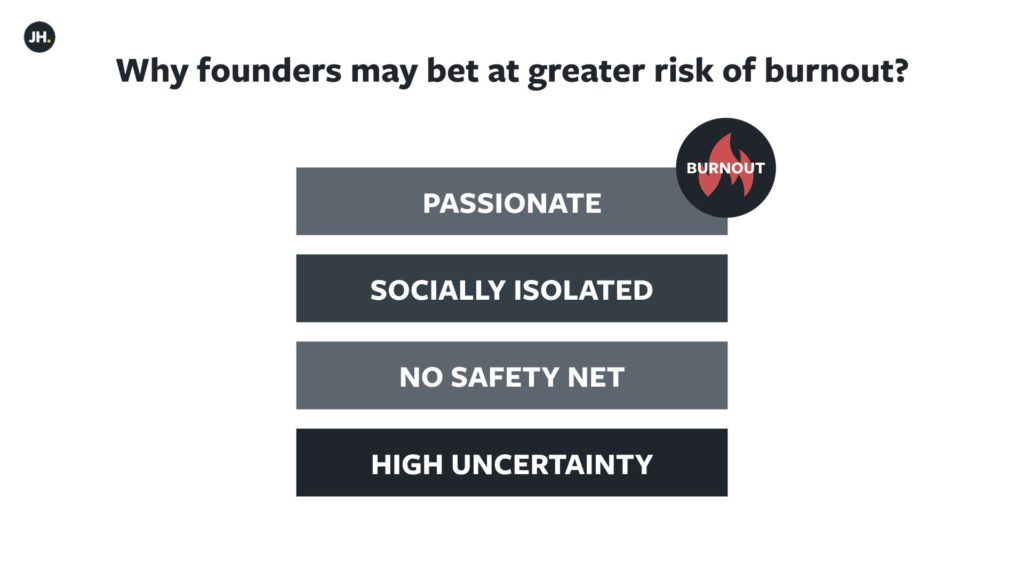Why are entrepreneurs, founders and, in fact, high-performers in general, at greater risk of burnout? Perhaps more importantly, what can we do about it?
Entrepreneurship (if you’re successful), or even reaching a senior position as a high-performer in an established organisation, can bring many rewards: financial, independence, a strong sense of achievement. However, these rewards can come with a cost. We accept that stress is a part of life for anyone trying to succeed and reach their potential. While some stress can enhance performance, when its unrelenting, as it can be for entrepreneur and many ‘driven’ people, it can lead to a host of negative physical and psychological outcomes, including job burnout1.
What Is Burnout?
A lot has been written about burnout, but the term is defined in many ways, by many different people, and the explanations are even more numerous. Some researchers suggest that burnout is a distinct state, others that it’s just another way to describe depression. A recent study found that correlations between burnout and depression were close to 1, among both women (0.91) and men (0.94)2. However, while it’s clear that there is overlap between burnout and other states and complaints, I think it’s still helpful to explore burnout as a condition. In particular, the distinction of burnout as having a ‘job-induced character’ may help us to consider some of the nuances that can make life and work less sustainable and compromise wellbeing, as well as help us to find possible solutions.
Recently, I measured burnout using a scale that conceives the syndrome as a combination of three factors, based on a sense of how complete or depleted our ‘energetic resources’ are3:
- Physical fatigue
- Cognitive weariness
- Emotional exhaustion
The early results of my research suggest that burnout is both predicted by, and is a predictor of some other important aspects of sustainable high performance in knowledge work (the subject of my research), such as Recovery Experiences, and Cognitive Performance.

Why Are Entrepreneurs At Greater Risk?
But what makes entrepreneurs, founders and high-performers at greater risk of burnout? Four aspects seem to put us at greater risk:
- Passion
- The perception (or reality) that there is no safety net
- Operating in an environment with a high-degree of uncertainty
- Social isolation (when work takes over)

So what can we do about it? If you’re worried about burnout, it’s essential to find proper treatment. Ideally, we would prevent it in the first-place. At the end of this article, I’ve included the contact details of some organisations who are well placed to provide expert support, based on the regions where many people read this blog. Please contact them if you have concerns about yourself, or someone you work with.
The preliminary analysis of data from a recent study I conducted (and which I’m writing up at the moment), suggests that Recovery Experiences (as I wrote about in this blog), are a significant predictor of burnout, as defined by the measure I mentioned earlier3, which focusses on burnout as the depletion of ‘energetic resources’
Detachment & Burnout
In particular, an aspect of recovery described as ‘Detachment’ had a very significant relationship with burnout. The concept of detachment is multi-facted, but in this context I’m referring to how well we are able to forget about, distance ourselves and get a break from work; something many high-performers struggle with.
I’ve created a simple check-list, below, to help us think about detachment, and how we could get better at ‘switching off’. Rate yourself on the 5 ‘switching off’ behaviours below, on a scale from 1-3, indicating whether you display these behaviours never, sometimes or often. You’ll end up with a score between 5-15, and while it’s not an academically validated tool, it may be a useful starting point and source of ideas for how you could potentially improve your recovery and reduce the risk of burnout.

References
- Shepherd, C. D. et al. (2010) ‘Entrepreneurial burnout: exploring antecedents, dimensions and outcomes’, Journal of Research in Marketing and Entrepreneurship, 12(1), pp. 71–79. doi: 10.1108/14715201011060894.
- Bianchi, R., Rolland, J. P. and Salgado, J. F. (2018) ‘Burnout, depression, and borderline personality: A 1,163-participant study’, Frontiers in Psychology, 8(JAN). doi: 10.3389/fpsyg.2017.02336.
- Shirom, A., and Melamed, S. (2006). A comparison of the construct validity of two burnout measures in two groups of professionals. Int. J. Stress Manag. 13, 176–200.





